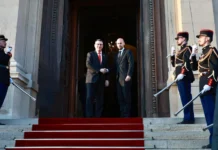“….till the class of philosophers be invested with the supreme authority in a state, such state and its citizens will find no deliverance from evil….”-Plato, The Republic
“I love the poorly educated.”-Donald J. Trump, 2016
It’s hardly a secret. During the once unimaginable Trump years – an ongoing era of conspicuous presidential dereliction and determined anti-reason[1] – Americans have been enduring a grievous national retreat. Earlier, in principle at least, and at a moment when “principle” still held certain tangible meanings, Plato’s Republic had provided a proper benchmark for many generations of college students. Here, acquainted with a learning-based view already well-known to Thomas Jefferson and to other founders of the American Republic (back then, our leaders actually read challenging books), such students could think interestingly and usefully about a “philosopher king.”
The lesson was “heavy,” of course, yet unambiguous. For earnest freshmen, this inspirational figure of commendable judgment and public righteousness was cast asthe one who could be trusted, the exemplary political leader, the witting thinkerwho could fuse real learning (not cheap merchandising, chicanery or electoral contrivance) with law-supporting national governance.[2]
Plato’s proposed leader represented what the interested scholars would call an “ideal-type,” and was not considered as an immediately graspable or pragmatic model for national political implementation. Nonetheless, it still served to remind entire societies that justice, virtue and decency could somehow be immensely practical. This dignifying message is patently absent from literally anywhere in the Trump White House. Correspondingly, with this Platonic example, higher education was regarded as an intrinsically worthwhile American experience, not just a tactical stepping stone to better vocation or higher personal income.
Back then, inter alia, American higher education was not just about learning how to extract narrowly personal benefits without regard for fulfilling certain much wider and necessary societal obligations.[3]
Back then, in essence, dignified learning was about rejecting the primal and persistently damaging ethos of “everyone for himself.”[4] In other words, worthwhile it itself, such learning was the literal opposite of what we now suffer hourly from a tweeting but non-reading American president.
There is more. Now, at a precarious time when extant US presidential liabilities are being amplified and multiplied by worldwide disease pandemic,[5] by a bewildering and frightful pestilential assault, it is a last good time to inquire as follows: What has happened to this once enviable and hopeful model of political leadership?
Significantly, the day-to-day betrayal of this model by an American president and his unswervingly obsequious henchmen in government and industry also represents a wholesale betrayal of America’s Founding Fathers. Though assuredly not understood by Donald Trump or any of his reflexively servile enforcers, the Founders who crafted the Declaration of Independence and the Constitution were animated by distinctly Platonic notions of wisdom and by the corollary high ideals of Natural Law.[6] Thomas Jefferson, especially, had argued that the core viability of the precarious new American republic would depend most of all upon the meaningful education of its citizens. For Jefferson, the kind of ignorant imposture we must now tolerate in the Trump White House would have been judged irreconcilable with any genuine democracy.
Myriad promises notwithstanding, Donald J. Trump could never plan to move us even inches toward a more properly virtuous and wise “polity.” Rather, and exactly as Plato had once feared in a generic sense, we Americans have already been deformed by a dissembling president who is unable and/or unwilling to distinguish between true knowledge and self-serving opinion. Much like the contemporary Sophists who Plato had recognized could only impair societal betterment and virtuous government, Donald J. Trump represents an utterly insidious caricature (one might even say here, a grotesque self-parody) of commendable national leadership.[7]
In this connection, the president now wittingly risks millions of American lives by personally taking over very complex medical and scientific judgments regarding Covid19.[8] When he is finally finished supplanting properly analytic assessments with his own propagandistic and conspiratorial views of the raging pestilence,[9] there will likely be more body bags piled up on our streets than were earlier evident during the Vietnam War.
That is a sobering and instructive image, one now well worth visualizing.
What about basic human compassion in the White House? As to any evidence of personal empathy or presidential concern for the millions of already suffering, ill and jobless fellow countrymen, Trump can only lament his own alleged punishments by the “fake news.” Grotesquely, even when confronted with the steadily mounting number of American fatalities to Covid19, his only thought is to urge “unfair” interlocutors to “be nice,” to be “more polite.”
There is more. Under Donald Trump’s sorely twisted presidential tutelage, we Americans can never expect any Platonic-style “deliverance from evil.” Rather, when we begin to consider the increasing threats of war and terrorism now tied up in various complex interactions with unpredictably virulent pathogens, such evil could prove greater than anything Plato might ever have imagined in the fourth century BCE. Looking toward these potentially existential perils, they could eventually include enemy nuclear attack and/or biological terrorist assaults against the American homeland.[10]
If anyone in President Trump’s governing inner circle should ever come around to acknowledge such hazards, it would have to be done with a proper obeisance to Der Fuehrer; that is, obliquely, disingenuously, sotto voce.
Nothing more.
Ironically, in this pestilential age of rampant pandemic, a time of global war, terror and plague, the absence of a suitably wise American leadership could render vastly more probablethe weaponized pathogens of some present or future adversary. To wit, as Donald Trump rules openly and entirely by untruth and obfuscation – “in his own flesh”[11] – he simultaneously undermines utterly vital US relations with Russia, China, India, Pakistan and North Korea.
“I love chaos,” volunteered Donald Trump with uncharacteristic honesty on March 4, 2018. Portentously, there is ample confirming evidence of just such a dissembling love (a perverse sentiment he also applied several times to his personal relationship with North Korean dictator Kim Jung Un) in the offhanded way Trump has stubbornly mishandled American testing and tracing for the Corona virus. Moreover, in late May 2020, this president announced plans to withdraw from the long-stabilizing Open Skies Treaty with Russia, another worrisome example of favoring gratuitous international belligerence (chaos) over any correctly law-based patterns of international cooperation.[12]
Every four years, We the people – we ina nation which had once been nurtured by American Transcendentalist Ralph Waldo Emerson’s Platonic call for high thinking and by Henry David Thoreau’s complementary (and similarly Platonic) plea to “consider the way in which we spend our lives” – push aside any still-recognizable serious thought. Obediently, as a deformed society that loathes complexity and looks ever anxiously for simple explanations, we Americans may yet again reduce complex US policy issues to a crass assortment of numbing clichés and empty witticisms. Whatever else one might say about the rapidly-approaching election, choosing an American president will once again be fraught with abundantly delusionary expectations, and with conspicuously uninformed or incoherent policy platforms.
Endlessly, in our quadrennial presidential election contests, the celebrity politician draws huge audiences and generous donors in spite ofan ineffable absence of substance. Always, in our infantile and banal national politics, less intellect is more pragmatic. Now, with Donald Trump still able to be taken seriously by so many Americans, less discernible intellectual substance still spells tangible candidate advantage. With this starkly benighted incumbent, outright buffoonery has often become indisputable electoral advantage.
Credo quia absurdum, said the ancient philosophers. “I believe because it is absurd.”
There is more. The harshly demeaning and dangerous Trump presidency bears witness to America’s unprecedented national decline – a declension of both the electorate and the Republic for which it stands. Now, whenever the sitting president’s words seethe with altogether evident worthlessness, a still-adoring crowd rushes in from the wings to applaud. Mixing desperation with a curiously self-imposed absence of memory and learning, it nods approvingly, en masse, and in more-or-less compliant “social distancing,” cheerlessly celebrates what it presumptuously calls “American Exceptionalism.” The celebrations are without authentic joy because any tangible evidence that America is “great again” would be preposterous prima facie.
If it were in any way identifiable, it would then represent a glaring contradiction in terms.
Once, many of our national heroes, including those who could and would actually read, were created by something other than marketing and crude commerce.[13] Today, a “normally” incoherent American president has become an embarrassing pitchman, a circus-announcer fashioned by careful manipulation and persistently meticulous misrepresentations. Far more ominously, of course, America trusts this sitting president with life or death nuclear command decisions,[14] a complex set of expectations that is always subject not only to willful deviations, but also to wholly unpredictable episodes of decisional irrationality.[15]
Let us finally be candid. The American “emperor” is more than just occasionally mistaken. He is hideously and very plainly “naked.” Most worrisome, in this regard, especially for any still-remaining American national future, is an election process that will likely remain shabby and demeaning, that will gratuitously mock all elements of genuine learning, and that proves shamelessly refractory to all residual hints of American intelligence and virtue.
In principle, somehow, this ill-fated election process can still be civilized and transformed, but only after critical personal meanings in America can finally be detached from a ubiquitously craven and vulgar commerce. The American Republic, it must then be acknowledged, represents significantly more than just another gaming or real estate deal fashioned by Babbitts and politicos who have never heard of Plato or Jefferson or Blackstone, and have no clue as to what is actually discoverable in the US Constitution. Soon, governing this democracy, it must be acknowledged, will require more than another blustering and self-promoting illiterate buffoon.
Much more.
We must now finally be candid. Plato’s prescriptively high standard of political leadership remains unassailably out of America’s ordinary reach. Still, this guiding standard may serve to remind us just how far we have already managed to descend from the Republic’s original expectations and how far we will need to advance to fully rescue and restore the imperiled United States. No one can reasonably expect Donald Trump or even the other party’s presidential candidate to become another Thomas Jefferson, but we should still hold every presidential aspirant to some at least minimal standards of intellect, seriousness and learning.
Sustaining and expecting some rudimentary intellectual life in the United States is hardly a dispensable option. In the final analysis, a more far-reaching American respect for a genuine life of the mind is required not “merely” for national physical survival, but also for the most fragmentary implementations of virtue. In the seventeenth century, Blaise Pascal, in his eternally elucidating Pensées, effectively summarized Plato: “All our dignity, then, consists in thought. It is upon this that we must depend, not on space and time, which we would not in any case be able to fill. Let us labour then, to think well (emphasis added): this is the foundation of morality.”[16]
There is one last and prospectively overriding point left to make. It is that the manifold derelictions of an anti-intellectual American society must inevitably “spill over” into the wider global arena, sometimes “synergistically,”[17] and thus weaken this country’s overall position in world politics. Accordingly, it was modern French thinker and poet, Guillaume Apollinaire, who understood the corresponding bit of wisdom better than most: “It must not be forgotten that it is perhaps more dangerous for a nation to allow itself to be conquered intellectually than by arms.”[18]
Now, beleaguered by plague as well as by the more “ordinary” hazards of foreign affairs – war, terrorism and genocide – Americans could do worse than consciously resurrect certain core principles of Plato’s Republic.
Far worse.
So long as we wittingly ensconce Plato’s “supreme authority” in the hands of a manifestly unfit American president, we should rightfully expect no quarter from adversaries of any kind or magnitude, no reassuringly Platonic “deliverance from evil.”
None at all.
[1] “There is something inside all of us,” writes twentieth century German philosopher Karl Jaspers, “that yearns not for reason, but for mystery – not for penetrating clear thought but for the whisperings of the irrational….” See: Reason and Anti-Reason in Our Time, Archon Books, 1971, p.67.
[2]Generally, the pertinent obligations of international law are also obligations of US law. In the words of Mr. Justice Gray, delivering the judgment of the US Supreme Court in Paquete Habana (1900): “International law is part of our law, and must be ascertained and administered by the courts of justice of appropriate jurisdiction….” (175 U.S. 677(1900)) See also: Opinion in Tel-Oren vs. Libyan Arab Republic (726 F. 2d 774 (1984)).Moreover, the specific incorporation of treaty law into US municipal law is expressly codified at Art. 6 of the US
Constitution, the so-called “Supremacy Clause.”
[3] See, by this author, at The Daily Princetonian : https://www.dailyprincetonian.com/article/2018/06/a-core-challenge-of-higher-education
[4] Says French Jesuit philosopher Pierre Teilhard de Chardin in The Phenomenon of Man: “The egocentric ideal of a future reserved for those who have managed to attain egoistically the extremity of `everyone for himself’ is false and against nature.” Nonetheless, at the international level, Trump has amplified the competitive nature of America’s Covid19 policies, a brand of “vaccine nationalism” that is the reductio ad absurdum of his more generally belligerent stance in world politics.
[5] Says Albert Camus in The Plague (1947): “At the beginning of the pestilence and when it ends, there’s always a propensity for rhetoric….It is only in the thick of a calamity that one gets hardened to the truth, to silence.”
[6] See Edward S. Corwin, THE “HIGHER LAW” BACKGROUND OF AMERICAN CONSTITUTIONAL LAW (1955); Alexander P. D’Entreves, NATURAL LAW: AN INTRODUCTION TO LEGAL PHILOSOPHY (1951). Additionally, Blackstone’s COMMENTARIES recognize that all law “results from those principles of natural justice, in which all the learned of every nation agree….” See William Blackstone, COMMENTARIES ON THE LAWS OF ENGLAND, adapted by Robert Malcolm Kerr (Boston; Beacon Press, 1962), Book IV, “Of Public Wrongs,” p. 62 (Chapter V., “Of Offenses Against the Law of Nations.”) Still earlier, a century before Demosthenes, Antigone’s appeal against Creon’s order to the “unwritten and steadfast customs of the Gods” had evidenced the inferiority of human rule-making to a Higher Law. Here, in the drama by Sophocles, Creon represents the Greek tyrant who disturbs the ancient harmony of the city state. Aristotle, in his RHETORIC, quotes from Sophocles’ ANTIGONE when he argues that “an unjust law is not a law.” See RHETORIC 1, 15, 1375, a 27 et seq.
[7] In just one example, during his May 21, 2020 tour of a Ford plant in Michigan, Trump refused to wear a mask. Though his explanation for this legal violation was that he didn’t want to give the press “the satisfaction” of seeing him in a mask (what that should actually mean is anyone’s guess), more likely he thought that wearing a mask would project an image of weakness, and – as everyone must already know – Der Fuehrer is not subject to the normal rules of biology and infection (just as he is allegedly immune to any normal expectations of law). In essence, Trump’s refusal implies that he stands all-powerful, conspicuously “above biology,” just as he allegedly stands uniquely and brazenly “above the law.”
[8] “I tested very positively,” Trump said confusedly on the South Lawn of the White House on May 21, 2020,. “So this morning, yeah, I tested positively toward negative, right? So no, I tested perfectly this morning. Meaning, meaning I tested negative. But that’s a way of saying it, positively toward the negative.” To be charitable about describing such telling presidential confusions, Trump has also had some “trouble” in the past offering proper terminology concerning his medical test results.
[9] https://www.yahoo.com/news/answers-va-given-hydroxychloroquine-1-220636232.html
See also: https://www.yahoo.com/news/massive-study-coronavirus-patients-shows-140100072.html
[10] Professor Beres is the author of some of the earliest books on nuclear war and nuclear terrorism, including Terrorism and Global Security: The Nuclear Threat (1979); Apocalypse: Nuclear Catastrophe in World Politics (1980); and Surviving Amid Chaos: Israel’s Nuclear Strategy (2016). His pertinent writings on this topic have been published in The New York Times; The Atlantic; Special Warfare (Pentagon); Modern War Institute (West Point); The War Room (Pentagon); Parameters: Journal of the US Army War College (Pentagon) International Journal of Intelligence and Counterintelligence; and The Bulletin of the Atomic Scientists.
[11] “The mass man has no attention to spare for reasoning,” warns 20th century Spanish philosopher Jose Ortega y’ Gassett in The Revolt of the Masses (1930), “he learns only in his own flesh.”
[12] Trump’s proposed withdrawal from the Open Skies Treaty (1992/2002) mirrored the U.S. decision to pull out of the Intermediate-range Nuclear Forces Treaty with Russia in August 2019.
[13] Sigmund Freud maintained a general antipathy to all things American. He most strenuously objected, according to Bruno Bettelheim, to this country’s “shallow optimism” and its seemingly corollary commitment to a disturbingly crude form of materialism. America, thought Freud, was very evidently “lacking in soul.” See: Bruno Bettelheim, Freud and Man’s Soul (New York: Alfred A. Knopf, 1983), especially Chapter X.
[14] See, by Professor Beres, at The Bulletin of the Atomic Scientists, https://thebulletin.org/2016/08/what-if-you-dont-trust-the-judgment-of-the-president-whose-finger-is-over-the-nuclear-button/
[15] Expressions of decisional irrationality in world affairs could take assorted and overlapping forms, and need not be a function of “madness.” These forms include a disorderly or inconsistent value system; computational errors in calculation; an incapacity to communicate efficiently; random or haphazard influences in the making or transmittal of particular decisions; and the internal dissonance generated by any structure of collective decision-making (i.e., assemblies of pertinent individuals who lack identical value systems and/or whose organizational arrangements impact their willing capacity to act as a single or unitary national decision maker).
[16] This is taken from Chapter XXIII of Pascal’s Pensées, “Grandeur de l’Homme.”
[17] Synergistic intersections are those that are “force-multiplying;” more precisely, ones wherein the “whole” is effectively greater than the more-or-less calculable arithmetic sum of its “parts.”
[18] See Guillaume Apollinaire’s “The New Spirit and the Poets,” 1917.


























